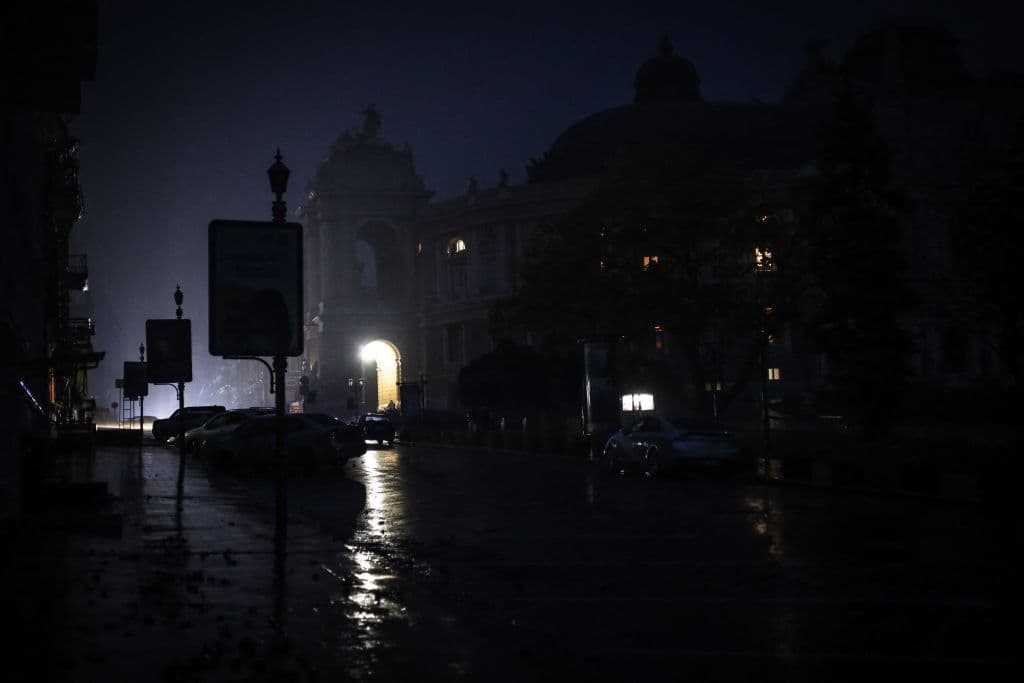Ukraine war latest: Half of Ukraine’s energy system disabled, says PM

Key developments on Nov. 18:
- Ukraine repels Russian advances near 9 settlements in east
- Zelensky discusses grain deal with Erdogan after the Turkish president spoke with Putin
- Nord Stream explosions came as a result of ‘gross sabotage,’ Swedish Security Service says
- Nearly 30% of Ukrainian territory is mined, according to State Emergency Service.
According to Prime Minister Denys Shmyhal, almost half of Ukraine’s energy system is out of order due to the massive Russian strikes.
He noted that on Nov. 15 alone, Moscow launched about 100 missiles, primarily targeting energy infrastructure across the country.
Energy Minister Herman Haluschenko then called the attack the “most massive” bombardment of power infrastructure since the beginning of the war.
“Russia is once again carrying out large-scale missile strikes on energy facilities,” the minister said, describing it as “another attempt at terrorist revenge” after military and diplomatic setbacks.
Russian missiles struck Kyiv and 10 regions across the country in the Nov. 15 attack. Critical infrastructure sites in Kharkiv, Rivne, Zhytomyr, and Lviv oblasts were hit.
According to Shmyhal, Ukraine needs support from European partners in the energy sector, such as the supply of additional equipment and extra financial aid.
The day before, President Volodymyr Zelensky said that over 10 million Ukrainians remained without electricity due to the Russian attacks.
On Nov. 16, Ukraine’s state-owned grid operator Ukrenergo warned of “hard days” after Russia launched the biggest attack on Ukraine’s energy system a day before, causing emergency power outages across the country.
The previous large-scale attacks targeting Ukraine’s energy infrastructure took place on three separate Mondays in October, resulting in mass power outages nationwide, including in Kyiv.
Since then, Kyiv and other busy cities have been grappling with power cuts under the government’s efforts to conserve electricity amid a Russian blitz on energy sites.
Nord Stream attacks investigation
The explosions that caused significant damage to the Nord Stream 1 and 2 pipelines near the Danish island of Bornholm in late September resulted from “gross sabotage,” Swedish Security Service reported on Nov. 18.
“Explosive residue was identified on a number of the seized and analyzed foreign items,” which investigators found at the site, the report reads.
The investigation continues the search for suspects, according to Swedish officials.
On Sept. 26-28, four leaks were discovered in the Nord Stream pipelines in the Baltic Sea that were built to supply natural gas from Russia to Germany. Following the leaks, several Western officials, including U.S. President Joe Biden, called them a “deliberate act of sabotage.”
Russian submarines were seen on Sept. 24-25 near the areas where the leaks were discovered, CNN reported, citing an unnamed Western intelligence official. Russia denied its responsibility for the explosions.
German media outlet Tagesspiegel reported in October, citing unnamed high-ranking German officials, that if the Nord Stream pipelines are not repaired immediately, salt water will quickly corrode the insides, and they will become irreparable.
According to Manfredi Caltagirone, the UN Environment Programme acting head, the damage to the Nord Stream pipelines has most likely caused the “largest emission” of methane ever recorded.
“This is the most wasteful way to generate emissions,” Caltagirone said.
Grain deal extension
“We praised the extension of the grain deal. I thanked (Turkish president) for supporting our Grain from Ukraine initiative and assured that Ukraine would remain a guarantor of food stability,” President Volodymyr Zelensky said following a phone conversation with his Turkish counterpart Recep Tayyip Erdogan on Nov. 18.
Earlier on Nov. 18, Erdogan spoke on the phone with Russian dictator Vladimir Putin.
Erdogan discussed the extension of the U.N.-backed grain initiative and told Putin that it is essential to resume peace talks with Kyiv, according to the Turkish presidential administration.
Ukrainian Infrastructure Minister Oleksandr Kubrakov said on Nov. 17 that the Black Sea Grain Initiative, known as the Ukraine grain deal, was extended for four months. According to the official, Ukraine, Russia, Turkey, and the UN reached an agreement in Istanbul.
The grain agreement was reached in July to unblock Ukrainian grain exports amid Russia’s full-scale invasion of the country.
On Oct. 29, Russia said it was suspending its participation in the grain deal due to a drone attack on Russian warships in the occupied port of Sevastopol. Russia blamed the attack on Ukraine. Kyiv hasn’t officially commented on its alleged involvement.
However, on Nov. 2, Russia made a U-turn and said it was staying in the deal.
The Black Sea grain deal, crucial for the continued export of much-needed Ukrainian grain by sea to Africa, Asia, and the Middle East, was set to expire on Nov. 19.
On the battlefield
The General Staff of Ukraine’s Armed Forces reported on Nov. 18 that Ukraine’s military repelled Russian attacks near Novoselivske and Stelmakhivka in Luhansk Oblast and Bilohorivka, Verkhniokamianske, Spirne, Opytne, Pervomaiske, Vodiane, and Novomykhailivka in Donetsk Oblast in the past 24 hours.
In the past day, Russian forces launched 27 missiles, five airstrikes, and over 50 MLRS attacks against Ukraine.
Russia has lost 350 troops in the last 24 hours, bringing the total number of troops lost during the full-scale invasion of Ukraine to 83,460 personnel, the General Staff said.
After the humiliating defeat in Kherson, Russian troops relocated some units from Kherson to Luhansk Oblast, Ukraine’s military reported. The troops moved to the town of Novoaidar in Luhansk Oblast, the report said.
Ukraine’s Armed Forces entered the city of Kherson on Nov. 11 after Russia retreated to the east bank of the Dnipro River. Kherson was Russia’s biggest gain since the beginning of the full-scale invasion on Feb. 24.
Following their retreat from the west bank of the Dnipro River, Russian forces prioritize replenishment, regrouping, and developing defensive lines in most areas of the front line in Ukraine, the U.K. Defense Ministry said on Nov. 18.
The ministry added that Russia would likely try to redeploy some of its personnel that left Kherson “to reinforce and expand its offensive operations” near Bakhmut in Donetsk Oblast.
Attacks and casualties
In the past day, Russian forces shelled Sumy Oblast seven times, Governor Dmytro Zhyvytskyi reported.
According to the official, Russian forces targeted Seredyna-Buda, Znob-Novhorodske, and Esman communities, using Grad missile launchers and mines.
In the southern Kherson Oblast, Russian forces killed one civilian on Nov. 17, Ukraine’s Southern Operational Command said. Chornobaivka, Antonivka, and Kherson came under fire from rocket launchers, mortars, and heavy artillery. One civilian was killed by shrapnel.
Russia’s Nov.17 strike at a residential building in Zaporizhzhia Oblast’s Vilniansk town killed 10 people, including two children, 11 and 17 years old, General Prosecutor’s Office said.
In the eastern Donetsk Oblast, Russian forces killed one civilian in Bakhmut and wounded four in Chasiv Yar, Governor Pavlo Kyrylenko reported on Nov. 18.
Russian troops also struck critical infrastructure in Kharkiv Oblast, damaging gas industry equipment near Izium, Governor Oleh Syniehubov said.
Eight emergency service workers and police officers were injured in an attempt to extinguish the fire, according to Syniehubov.









